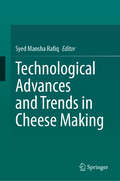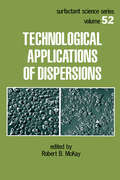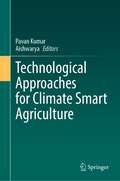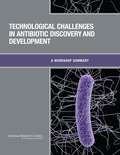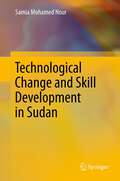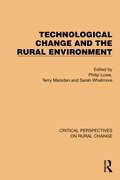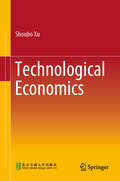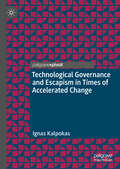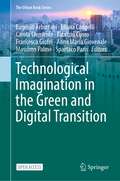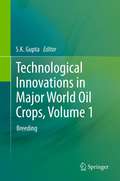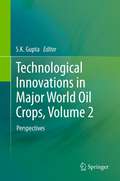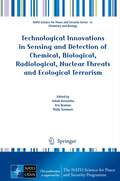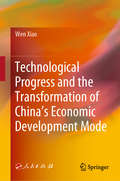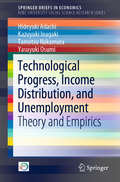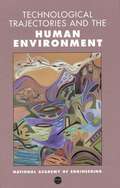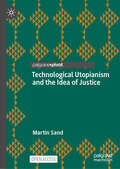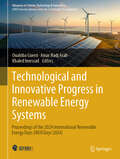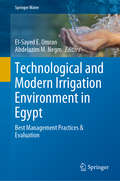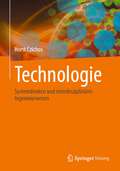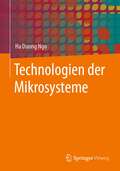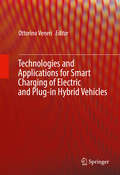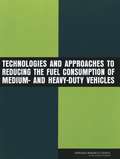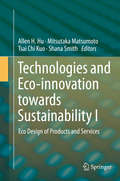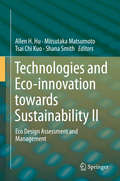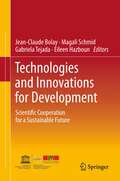- Table View
- List View
Technological Advances and Trends in Cheese Making
by Syed Mansha RafiqThis book provides a comprehensive overview of the cheese making process, from the roles of various starter cultures and coagulants through to the advanced cheese ripening process. The focus will be on technological advances in the manufacturing process, with attention devoted to varieties of stretch, hybrid, whey, vegan and dry milk cheeses. Other varieties discussed include low-fat and low-sodium cheese. Presenting the latest innovations regarding methods of preparation and modification, as well as packaging and preservation, this text is an essential guide to novel technologies in the cheese making process. Pertinent to this discussion will be considerations of quality and functionality, and the use of approaches such as infrared spectroscopy and electronic nose to assess these aspects. Novel cheese making methods including precision fermentation have also been discussed. A discussion of the history of cheese making also provides a rich entryway into the industry&’s contemporary iterations. For researchers and those with an interest in the cheese making industry, Technological Advances and Trends in Cheese Making will elucidate relevant methods and expand perspectives.
Technological Applications of Dispersions (Surfactant Science Ser. #52)
by Robert B. McKay"This comprehensive guide illustrates the effects of dispersions in applications, the means necessary to achieve these effects with optical results, and how to overcome or avoid the difficulties encounteredemphasizing the dispersions of solid particles in liquid or solid media."
Technological Approaches for Climate Smart Agriculture
by Pavan Kumar AishwaryaThis volume presents up-to-date information on technological advancements in climate smart farming systems, covering crop modeling, irrigation practices, spatial modeling and agricultural policy in the context of climate change. The book presents the main applications in climate smart agriculture through technological approaches including the primary agricultural dynamics, mitigation strategies for sustainable soil and crop security, climate smart solutions to improve soil health, and crop and livestock productivity. It will be useful for scientists, environmentalists, meteorologists, environmental consultants, and computing experts working in the areas of climate-smart agriculture though technological approaches.
Technological Challenges in Antibiotic Discovery and Development
by National Research Council Technology Chemical Sciences Roundtable Joe Alper Douglas Friedman Division On Earth Life Studies Board on Chemical SciencesTechnological Challenges in Antibiotic Discovery and Development is the summary of a workshop convened by the Chemical Sciences Roundtable in September 2013 to explore the current state of antibiotic discovery and examine the technology available to facilitate development. Through formal presentations and panel discussions, participants from academia, industry, federal research agencies discussed the technical challenges present and the incentives and disincentives industry faces in antibiotic development, and identified novel approaches to antibiotic discovery. Antibiotic resistance is a serious and growing problem in modern medicine and it is emerging as a pre-eminent public health threat. Each year in the United States alone, at least two million acquire serious infections with bacteria that are resistant to one or more antibiotics, and at least 23,000 people die annually as a direct result of these antibiotic-resistant infections. In addition to the toll on human life, antibiotic-resistant infections add considerable and avoidable costs to the already overburdened U.S. health care system. This report explores the challenges in overcoming antibiotic resistance, screening for new antibiotics, and delivering them to the sites of infection in the body. The report also discusses a path forward to develop the next generation of potent antimicrobial compounds capable of once again tilting the battle against microbial pathogens in favor of humans. Technological Challenges in Antibiotic Discovery and Development gives a broad view of the landscape of antibiotic development and the technological challenges and barriers to be overcome.
Technological Change and Skill Development in Sudan
by Samia Mohamed NourWith the ongoing restructuring in Sudan, structural issues such as the need for skill development and interaction with technological change need an in-depth analysis that this book offers. The central themes of this book are- required skill formation, upskilling of the workers, and their interaction with technological change in lieu of a deficient educational system and its implications. An empirical investigation of the causes and consequences of low skill and technology indicators using a primary survey at macro and micro levels is undertaken. This is followed by an examination of the interaction between the low skill and technology indicators, the relationships between skill, upskilling and technology indicators, skills mismatch, the uses and impacts of ICT and differences at firm as well as industry level as well as knowledge transfer effects. A set of recommendations towards the need for implementation of consistent policies, increasing incentives and collaboration between public and private institutions completes the book.
Technological Change and the Rural Environment (Critical Perspectives on Rural Change #2)
by Sarah Whatmore Philip Lowe Terry MarsdenOriginally published in 1990, this volume addresses issues surrounding global ecological changes and sustainability of present patterns of urbanisation and industrialisation. The book discusses these problems and other issues such as how rural environments in many developed and developing countries have been transformed by a technological revolution. Looking at a diverse range of topics from climate change to slurry pollution and the destruction of genetic resources to the risks of biotechnology, this volume addresses these issues which concern the dynamics and social relations of technological change in rural areas.
Technological Economics (Advances In Systems Science And Engineering (asse) Ser.)
by Shoubo XuThis book creatively puts forward the subject nature, object, system, theory, method and application of technical economics, and brings together the research achievements of 50 years, especially the latest research results. It is of great significance for the development of China's technical and economic disciplines and the cultivation of special talents for technical and economic development. It is of great significance for the solution of major technical and economic problems in economic and social development, and has a landmark significance in the history of world technical economics. The book can be used as teaching material for both the liberal arts, science and engineering students within higher education institutions, and as a leading cadre training source for engineers. Furthermore, it can facilitate readers engaged in policy making, program planning, macro control, evaluation of investment decision, feasibility studies, project with aspects such as government, consulting companies, banks, and financial personnel needs. Also this book can aid readers with engineering design, product development, business management, as well as with the needs of engineering and technical personnel and enterprise management personnel.
Technological Governance and Escapism in Times of Accelerated Change (Information Technology and Global Governance)
by Ignas KalpokasThis book examines escapist coping strategies brought about by the pace, breadth and governance of technological change. It argues that escapism manifests in various forms, ranging from nostalgia for a fantasised past of unhindered reason and agency, to progressive visions of societal and political improvement, and greater empowerment. Drawing on post-humanist theory and critical disability studies, the book also assesses how escapism should not be viewed as an unavoidable reaction to technological change, and develops a model for an ethically equitable relationship between humans and technology. It will appeal to all those interested in governance and politics, media and communication studies, technology studies, and philosophy.
Technological Imagination in the Green and Digital Transition (The Urban Book Series)
by Massimo Palme Eugenio Arbizzani Eliana Cangelli Carola Clemente Fabrizio Cumo Francesca Giofrè Anna Maria Giovenale Spartaco ParisThis open access book addresses the pressing need for sustainability in urban development and the use of technology, with cities to serve as the main stage for strategies that seek to meet the targets and the cross-sector priorities indicated in the EU’s Next Generation program, all in pursuit of a solid recovery on the part of the European economy, along lines of ecological transition, digitalization, competitiveness, training, and inclusion to overcome social, territorial, and gender differences.The international study encounter is meant to promote visions shared by architectural technology and other disciplines, which, though they may appear to differ, are closely interconnected, with the aim of achieving an open, interdisciplinary integration capable of proposing concrete projects regarding topics held to be of strategic importance to the future of the built environment. These are identified to draw up evolving scenarios of architecture and cities suited to reflection, at various levels, on innovative models of process and product.
Technological Innovations in Major World Oil Crops, Volume 1
by S. K. GuptaMajor world oil crops and their products are among the most valuable commodity in today's world trade. Over the past couple of decades, oilseed production has increased to become the most important world sources of vegetable oils, in response to the rising world population and living standard. Recent technological advances made in breeding major world oil crops have led to higher production and improved product quality.This comprehensive volume encompasses recent innovations and practice in the production and use of different oil crops, including Brassica, Sunflower, Safflower, Cottonseed, Castor, Olive, Coconut, Oilpalm, Sesame, Groundnut, and Soybean. The contributors are leading specialists from different countries of the world. Much of the literature available on these crops is not up-to-date; hence this volume is a ready reference for researchers, breeders, biotechnologists, industrialists, and nutritionists. Dr. Surinder Kumpar Gupta, born in 1959, is currently working as Professor/Chief Scientist (Oilseeds) Plant Breeding & Genetics and Nodal officer in the School of Biotechnology, S K University of Agricultural Sciences & Technology. He holds a brilliant academic and service record and has been devoted to research on Oilseed Brassicas for nearly two decades. He obtained his post-graduate degree and PhD from Punjab Agricultural University. He is a recipient of a post-doctoral Fellowship in Plant Biotechnology and has published more than 100 research papers in esteemed national and international journals, mostly on Brassicas. He has already developed five varieties of rapeseed-mustard, and has written two books and edited three volumes on rapeseed & mustard breeding. For his excellent scientific endeavors, he has been conferred the 'Young Scientists Award: 1993-1994' by the State Department of Science & Technology.
Technological Innovations in Major World Oil Crops, Volume 2
by S. K. GuptaThe present volume presents essential information on advancements in oilseed production, processing and utilization. Advances in the technology of seed processing to produce oil and oil quality for edible and industrial applications are well presented, followed by hybrid technology, biotechnology, oil technology and meal quality for animal nutrition. The following areas are also covered: the potential for oil in developing biodiesel markets, fatty acid long chains and their derivative, pollination management, and safety of pollinators from harmful effects of pesticides. This volume also includes an economic assessment of oilseed integrated pest management (IPM) programs in different regions of the world. Dr. Surinder Kumar Gupta is Professor/Chief Scientist (Oilseeds) Plant Breeding & Genetics and Nodal officer in School of Biotechnology, S K University of Agricultural Sciences & Technology, Faculty of Agriculture, Chatha, Jammu-India. He holds a distinguished academic and service record and has been devoted primarily to research on oilseed Brassicas for nearly two decades. He has written two books on plant breeding and edited three volumes, one on 'Recent Advances in Oilseed Brassicas', Kalyani Publishers, New Delhi, India, second on 'Rapeseed Breeding-Advances in Botanical Research', Vol. 45, Academic Press, Elsevier Publishers and third on Biology and Breeding of crucifers, CRC Publishers, Taylor and Francis Group.
Technological Innovations in Sensing and Detection of Chemical, Biological, Radiological, Nuclear Threats and Ecological Terrorism
by Ashok Vaseashta Eric Braman Philip SusmannThis book arises from the NATO Advanced Study Institute "Technological Innovations in Detection and Sensing of CBRN Agents and Ecological Terrorism" held in Chisinau, Republic of Moldova in June 2010. It comprises a variety of invited contributions by highly experienced educators, scientists, and industrialists, and is structured to cover important aspects of the field that include developments in chemical-biological, and radiation sensing, synthesis and processing of sensors, and applications of sensors in detecting/monitoring contaminants introduced/dispersed inadvertently or intentionally in air, water, and food supplies. The book emphasizes nanomaterials and nanotechnology based sensing and also includes a section on sensing and detection technologies that can be applied to information security. Finally, it examines regional, national, and international policies and ethics related to nanomaterials and sensing. It will be of considerable interest and value to those already pursuing or considering careers in the field of nanostructured materials and nanotechnology based sensing, In general, it serves as a valuable source of information for those interested in how nanomaterials and nanotechnologies are advancing the field of sensing, detection, and remediation, policy makers, and commanders in the field.
Technological Progress and the Transformation of China’s Economic Development Mode
by Wen XiaoThis book explores how technological progress accelerates the transformation of economic development by adopting a fundamental logical approach to technological progress, intensive inputs, and promotion of productive efficiency to transformation of economic development. It investigates the internal mechanisms and the choice of corresponding modes that initiate technological progress to accelerate the transformation of economic development at three basic research levels: micro-enterprise level, mid-industry level and macro-economy level. Based on the above research, the book summarizes four dimensions facilitating the transformation: agricultural intensification, new industrialization, modernization of the service industry and the advanced manufacturing industry, and linkage of the modern service industry. This book is especially valuable in its hierarchical categorization covering theoretical, empirical, industrial and strategic exploration. On one hand, it analyzes the mechanisms and approaches influencing the transformation of economic development driven by technological progress from both theoretical and empirical perspectives. On the other hand, based on the introduction of advanced international experiences, it probes into the guarantee basis for the strategic implementation and the corresponding mode choices of the transformations. Furthermore, it offers specific policy proposals from both the macro level of how technological progress promotes the transformation of economic development and the micro level covering the agricultural, industrial and service industries.
Technological Progress, Income Distribution, and Unemployment: Theory and Empirics (SpringerBriefs in Economics)
by Hideyuki Adachi Kazuyuki Inagaki Tamotsu Nakamura Yasuyuki OsumiThis volume develops original methods of analyzing biased technological progress in the theory and empirics of economic growth and income distribution. Motivated by sharp increases in wage and income inequalities in the world since the beginning of the new century, many macroeconomists have begun to realize the importance of biased technological changes. However, the comprehensive explanations have not yet appeared. This volume analyzes the effects of factor-biased technological progress on growth and income distribution and shows that long-run trends of the capital-income ratio and capital share of income consistent with Piketty’s 2014 empirical results emerge. Incorporating the modified version of induced innovation theory into the standard neoclassical growth model, it also explains the long-run fluctuations of growth and income distribution consistent with the data shown in Piketty. Introducing a wage-setting function, the neoclassical growth model is modified to account for unemployment as well as to examine the dynamics of unemployment and the labor share of income under biased technological progress. Applying a new econometric method to Japanese industrial data, the authors test the key assumptions employed and important results derived in the theoretical part of this book.
Technological Trajectories and the Human Environment
by Jesse H. Ausubel H. Dale LangfordTechnological Trajectories and the Human Environment provides a surprising projection of a much greener planet, based on long-range analysis of trends in the efficient use of energy, materials, and land.The authors argue that we will decarbonize the global energy system and drastically reduce greenhouse gas emissions. We will dematerialize the economy by leaner manufacturing, better product design, and smart use of materials. We will significantly increase land areas reserved for nature by conducting highly productive and environmentally friendly agriculture on less land than is used today, even as global population doubles.The book concludes that the technological opportunities before us offer the possibility of a vastly superior industrial ecology. Rich in both data and theory, the book offers fresh analyses essential for everyone in the environmental arena concerned with global change, sustainable development, and profitable investments in technology.
Technological Utopianism and the Idea of Justice
by Martin SandThis open access book advances a modest defence of technological utopias. While technological utopianism is not devoid of risks and elitism, their benefits should not be discounted in an overall assessment. Rather than rejecting them based on a too narrow definition of utopianism, we must acknowledge their potential to exceed the individualist vs. collectivist dichotomy ascribed to traditional utopias. The author argues, with reference to Rawls’ idea of the basic structure that technological utopias challenge our understanding of the scope and location of justice and, thereby, advance the idea of justice. The book critically reviews the most recent literature in political philosophy, where utopias are understood as ideal theories of justice and sides with recent contributions to Utopian Studies, where utopias’ potential to estrange from the present and galvanize action are underscored.
Technological and Innovative Progress in Renewable Energy Systems: Proceedings of the 2024 International Renewable Energy Days (IREN Days'2024). (Advances in Science, Technology & Innovation)
by Ouahiba Guerri Amar Hadj Arab Khaled ImessadThis book is the proceedings of the papers presented during the International Renewable Energy Days on May 28–30, 2024, in Algiers (IrenDays’2024). It provides a comprehensive and current overview in the field of renewable energies and their role in promoting a sustainable world. Whether solar, wind, hydrogen, biomass or bioenergy, this book covers a wide range of topics including resource assessment and forecasting, energy conversion and efficiency, renewable grid integration, innovative technologies and new materials, energy efficiency in buildings, energy storage, sustainable hydrogen, alternative fuels, desalination and water treatment, as well as energy policy and economic aspects of renewable energy. Including the latest research studies on renewable energy, this book presents a review of recent developments in renewable energy systems and their applications, along with the challenges to their widespread use. Furthermore, this book includes suggestions resulting from discussions at roundtables on “Innovation in Renewable Energy: Strategy and Standards” and “Artificial Intelligence for Renewable Energy Systems.” This book is aimed at researchers, scientists and postgraduate students as it provides an in-depth overview of the most recent advances in the field of renewable energy and sustainable development. It could serve as a guide for industrialists and policy makers in emerging countries, as it provides best practices in the renewable energy sector and suggests the development of a renewable energy strategy. This book not only informs but also can contribute to a greener planet and a sustainability-oriented future.
Technological and Modern Irrigation Environment in Egypt: Best Management Practices & Evaluation (Springer Water)
by Abdelazim M. Negm El-Sayed E. OmranThis book gathers contributions on modern irrigation environments in Egypt from an environmental and agricultural perspective. Written by leading experts in the field, it discusses a wide variety of modern irrigation problems. In the context of water resources management in Egypt, one fundamental problem is the gap between growing water demand and limited supply. As such, improving irrigation systems and providing farmers with better control over water are crucial to increasing productivity. The book presents state-of-the-art technologies and techniques that can be effectively used to address a range of problems in modern irrigation, as well as the latest research advances. Focusing on water sensing and information technologies, automated irrigation technologies, and improved irrigation efficiency. It brings together a team of experts who share their personal experiences, describe the various applications, present recent advances, and discuss possibilities for interdisciplinary collaboration and implementing the techniques covered
Technologie: Systemdenken und interdisziplinäres Ingenieurwesen
by Horst CzichosDieses prägnante Lehrbuch führt einen Systemansatz in die Technik ein und beschreibt tribologische, mechatronische und cyber-physikalische Systeme sowie das technologische Konzept der Industrie 4.0 für Studierende verschiedener technischer Fachrichtungen. "Technologie" bezieht sich in diesem Buch auf die Gesamtheit der vom Menschen geschaffenen, nutzenorientierten Produkte, die auf technischen Kombinationen von Material, Energie und Information basieren. Dr. Czichos untersucht Technologie in diesem Band im Kontext des Systemdenkens im Hinblick auf die folgenden Haupttechnologiebereiche:Technische Systeme mit "interagierenden Oberflächen in Relativbewegung", insbesondere im Maschinenbau, in der Produktion und im Transportwesen; einschließlich der Analyse von reibungsbedingten Energieverlusten und verschleißbedingter Materialdissipation. Technische Systeme, die eine Kombination aus Mechanik, Elektronik, Steuerung und Computertechnik für die Bedürfnisse von Industrie und Gesellschaft erfordern. Technische Systeme mit einer Kombination aus Mechatronik und Internetkommunikation. Cyber-physikalische Systeme für die Digitalisierung der Industrie im Entwicklungsprojekt Industrie 4.0.Betrachtet Technik als Kombination aus der physischen Welt und der digitalen virtuellen Welt der Information und Kommunikation.Beschreibt den Produktzyklus von technischen Systemen und die Eckpfeiler der Technik: Material, Energie und Information.Stellt eine ganzheitliche Betrachtung von Technik und Engineering dar.
Technologien der Mikrosysteme
by Ha Duong NgoDas Buch vermittelt die Grundlagen zur Herstellung und dem Aufbau von Mikrosystemen. Es kann in zwei Teile aufgeteilt werden. Der Schwerpunkt von Teil I liegt hierbei auf den Mikrofertigungsprozessen und behandelt die Siliziumtechnologie, mikromechanische Strukturierungs- (anisotropes Ätzen, DRIE) und Bondprozesse (Eutectic Bonding, Fusion Bonding). Teil II behandelt die Aufbau- und Verbindungstechnik für Mikrosysteme und vermittelt Kenntnisse zu den Prinzipien der Chipmontage. Dabei stehen u.a. die Beschichtungstechnologien (Metallisierungssysteme) und Kontaktiertechnologien (Löten, Kleben, Bonden) im Vordergrund.
Technologies and Applications for Smart Charging of Electric and Plug-in Hybrid Vehicles
by Ottorino VeneriThis book outlines issues related to massive integration of electric and plug-in hybrid electric vehicles into power grids. Electricity is becoming the preferred energy vector for the next new generation of road vehicles. It is widely acknowledged that road vehicles based on full electric or hybrid drives can mitigate problems related to fossil fuel dependence. This book explains the emerging and understanding of storage systems for electric and plug-in hybrid vehicles. The recharging stations for these types of vehicles might represent a great advantage for the electric grid by facilitating integration of renewable and distributed energy production. This book presents a broad review from analyzing current literature to on-going research projects about the new power technologies related to the various charging architectures for electric and plug-in hybrid vehicles. Specifically focusing on DC fast charging operations, as well as, grid-connected power converters and the full range of energy storage systems. These key components are analyzed for distributed generation and charging system integration into micro-grids. The authors demonstrate that these storage systems represent effective interfaces for the control and management of renewable and sustainable distributed energy resources. New standards and applications are emerging from micro-grid pilot projects around the world and case studies demonstrate the convenience and feasibility of distributed energy management. The material in this unique volume discusses potential avenues for further research toward achieving more reliable, more secure and cleaner energy.
Technologies and Approaches to Reducing the Fuel Consumption of Medium- and Heavy-Duty Vehicles
by National Research Council of the National AcademiesTechnologies and Approaches to Reducing the Fuel Consumption of Medium- and Heavy-Duty Vehicles evaluates various technologies and methods that could improve the fuel economy of medium- and heavy-duty vehicles, such as tractor-trailers, transit buses, and work trucks. The book also recommends approaches that federal agencies could use to regulate these vehicles' fuel consumption. Currently there are no fuel consumption standards for such vehicles, which account for about 26 percent of the transportation fuel used in the U.S. The miles-per-gallon measure used to regulate the fuel economy of passenger cars. is not appropriate for medium- and heavy-duty vehicles, which are designed above all to carry loads efficiently. Instead, any regulation of medium- and heavy-duty vehicles should use a metric that reflects the efficiency with which a vehicle moves goods or passengers, such as gallons per ton-mile, a unit that reflects the amount of fuel a vehicle would use to carry a ton of goods one mile. This is called load-specific fuel consumption (LSFC). The book estimates the improvements that various technologies could achieve over the next decade in seven vehicle types. For example, using advanced diesel engines in tractor-trailers could lower their fuel consumption by up to 20 percent by 2020, and improved aerodynamics could yield an 11 percent reduction. Hybrid powertrains could lower the fuel consumption of vehicles that stop frequently, such as garbage trucks and transit buses, by as much 35 percent in the same time frame.
Technologies and Eco-innovation towards Sustainability I: Eco Design of Products and Services
by Mitsutaka Matsumoto Allen H. Hu Tsai Chi Kuo Shana SmithThis 2-volume book covers the state-of-the-art of the research and practices on eco-design. It covers the latest topics in the field: e.g. global eco-design management, big data in eco-design, social perspectives in eco-design; as well as emphasizing the developments in emerging economies such as Asian countries. Eco-design of products and product-related services are indispensable to realize the circular economy and to increase resource efficiencies of our society. Eco-design practices are necessary both in developed countries and developing countries. The book chapters are contributed by the worldwide authors, especially authors from East Asian countries, European countries, and Southeast Asian countries, and contains selected presentations at the EcoDesign2017 symposium (10th International Symposium on Environmentally Conscious Design and Inverse Manufacturing). The first volume highlights products and services, the chapters include the product life cycle design and business strategy, technologies for the future and sustainability, as well as social perspectives in eco-design.
Technologies and Eco-innovation towards Sustainability II: Eco Design Assessment and Management
by Mitsutaka Matsumoto Allen H. Hu Tsai Chi Kuo Shana SmithThis 2-volume book covers the state-of-the-art of the research and practices on eco-design. It covers the latest topics in the field: e.g. global eco-design management, big data in eco-design, social perspectives in eco-design; as well as emphasizing the developments in emerging economies such as Asian countries. Eco-design of products and product-related services are indispensable to realize the circular economy and to increase resource efficiencies of our society. Eco-design practices are necessary both in developed countries and developing countries. The book chapters are contributed by the worldwide authors, especially authors from East Asian countries, European countries, and Southeast Asian countries, and contains selected presentations at the EcoDesign2017 symposium (10th International Symposium on Environmentally Conscious Design and Inverse Manufacturing).The second volume focus on assessment and management, including topics such as sustainable manufacturing and End of Life (EOL) management, sustainability assessment, policy and regulations and Incentives for eco-design.
Technologies and Innovations for Development
by Alexandre Schmid Eileen Hazboun Jean-Claude Bolay Gabriela TejadaTechnological innovation - combined with scientific research - has always constituted a driving force of transformation in our societies. At the same time, it is no longer simply possible to transfer technologies from the North to the South; it is also essential to consider technical innovations that are adapted to the social, environmental, cultural and economic conditions of receiving countries, and which can be appropriated by their potential users and as such prove to be real technologies for fostering development. The first International Scientific Conference on the topic organized by the UNESCO Chair Technologies for Development at the Ecole Polytechnique Fédérale de Lausanne in 2010 focused on its four priority sectors: Technologies for Sustainable Development of Habitat and Cities, ICTs for the Environment, Science and Technology for Disaster Risk Reduction, and Technologies for the Production of Sustainable Energy. This volume reflects the main outcomes of the conference and provides some significant orientation and success criteria for the effective implementation and use of innovative technologies, their aims, their particular applications in the context of developing countries, their accessibility for users, and their appropriation by producers and stakeholders in the field of development both in the North and South, thus ensuring their sustainability. This kind of scientific cooperation also highlights the added values for northern researchers in sharing their knowledge and know-how, leading to a real win-win partnership. The authors gathered within this book include representatives from academic and research institutions and other organizations from diverse countries and offer a significant synergy of competences, approaches and disciplines.
